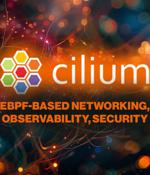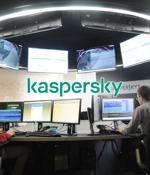Security News > 2024 > June

The U.S. Department of Commerce's Bureau of Industry and Security (BIS) on Thursday announced a "first of its kind" ban that prohibits Kaspersky Lab's U.S. subsidiary from directly or indirectly...

Cilium is an open-source, cloud-native solution that leverages eBPF technology in the Linux kernel to provide, secure, and monitor network connectivity between workloads. eBPF is a technology originating from the Linux kernel that allows sandboxed programs to run in a privileged context, such as the operating system kernel.

A Panaseer investigation into organizations’ annual 10-K filings reported to the SEC shows that from January-May 2024, at least 1,327 filings mentioned NIST – a key indicator that cybersecurity...

Today, the Biden administration has announced an upcoming ban of Kaspersky antivirus software and the pushing of software updates to US companies and consumers, giving customers until September 29, 2024, to find alternative security software. "Today, the Department of Commerce's Bureau of Industry and Security announced a Final Determination prohibiting Kaspersky Lab, Inc., the U.S. subsidiary of a Russia-based anti-virus software and cybersecurity company, from directly or indirectly providing anti-virus software and cybersecurity products or services in the United States or to U.S. persons," reads a new announcement from the US BIS agency.

Your profile can be used to present content that appears more relevant based on your possible interests, such as by adapting the order in which content is shown to you, so that it is even easier for you to find content that matches your interests. Content presented to you on this service can be based on your content personalisation profiles, which can reflect your activity on this or other services, possible interests and personal aspects.

A newly discovered vulnerability in Phoenix SecureCore UEFI firmware tracked as CVE-2024-0762 impacts devices running numerous Intel CPUs, with Lenovo already releasing new firmware updates to resolve the flaw. Due to the large number of Intel CPUs using this firmware, the vulnerability has the potential to impact hundreds of models from Lenovo, Dell, Acer, and HP. UEFI firmware is considered more secure as it includes Secure Boot, which is supported by all modern operating systems, including Windows, macOS, and Linux.

Your profile can be used to present content that appears more relevant based on your possible interests, such as by adapting the order in which content is shown to you, so that it is even easier for you to find content that matches your interests. Content presented to you on this service can be based on your content personalisation profiles, which can reflect your activity on this or other services, possible interests and personal aspects.

Your profile can be used to present content that appears more relevant based on your possible interests, such as by adapting the order in which content is shown to you, so that it is even easier for you to find content that matches your interests. Content presented to you on this service can be based on your content personalisation profiles, which can reflect your activity on this or other services, possible interests and personal aspects.

A vulnerability dubbed "CosmicSting" impacting Adobe Commerce and Magento websites remains largely unpatched nine days after the security update has been made available, leaving millions of sites open to catastrophic attacks. "CosmicSting is the worst bug to hit Magento and Adobe Commerce stores in two years," says Sansec.

The RansomHub ransomware operation is using a Linux encryptor designed specifically to encrypt VMware ESXi environments in corporate attacks. The existence of a Windows and Linux RansomHub encryptor has been confirmed since early May. Recorded Future now reports that the threat group also has a specialized ESXi variant in its arsenal, which it first saw in April 2024.